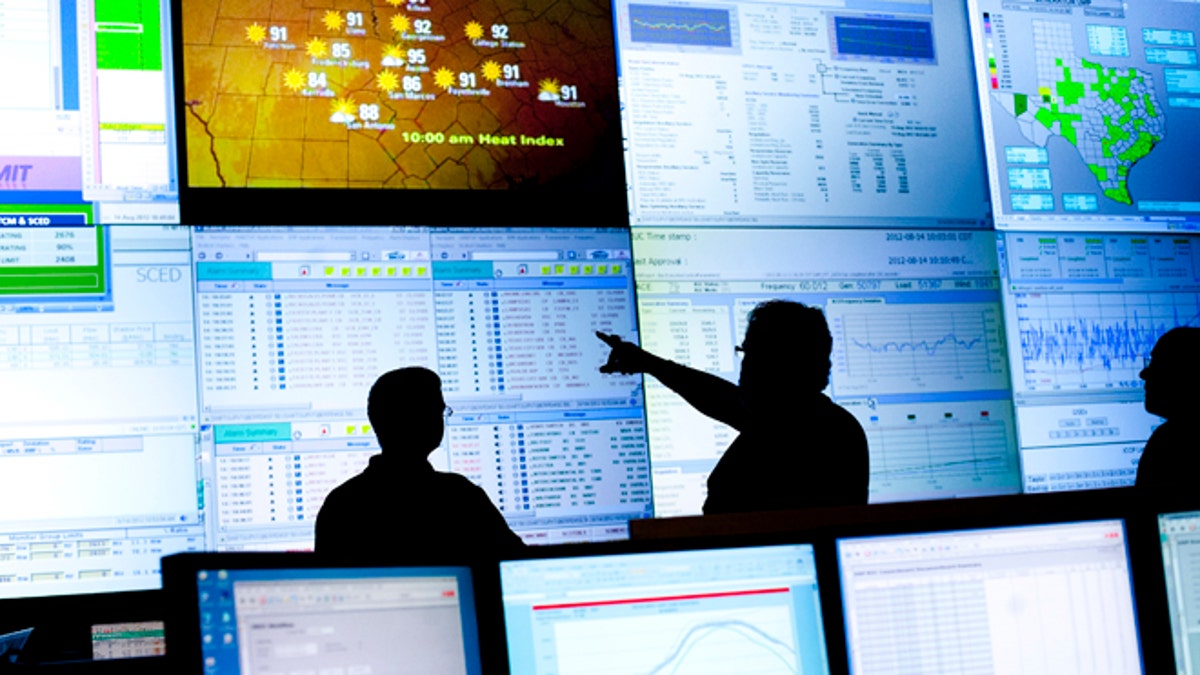
FILE: August 14, 2012: A view of the U.S. power grid from inside of the Electric Reliability Council of Texas's command center in Taylor, Texas. (REUTERS)
Newly reported details about a 52-minute sniper attack on a central California electrical substation last year are raising concerns from Capitol Hill and beyond, amid questions over whether it was the work of terrorists.
The April 16, 2013, attack had not been widely publicized until The Wall Street Journal reported new details in a story on Wednesday. The attack reportedly started when at least one person entered an underground vault to cut telephone cables, and attackers fired more than 100 shots into Pacific Gas & Electric’s Metcalf transmission substation, knocking out 17 transformers. Electric officials were able to avert a blackout, but it took 27 days to repair the damage.
The FBI doesn’t think the incident was a terror attack, an agency spokesman told the Journal. However, Jon Wellinghoff, chairman of the Federal Energy Regulatory Commission at the time, disagrees.
Wellinghoff, a now-retired George W. Bush appointee, called it “the most significant incident of domestic terrorism involving the U.S. power grid that has ever occurred.”
No arrests have been made in the case. But the Republican-led House Energy and Commerce Committee said Wednesday that lawmakers continue to follow the probe and that protecting the grid remains a top priority.
"We are aware of the attack and continue to monitor the investigation closely,” a committee spokeswoman told FoxNews.com. “Committee staff has been briefed by agency officials and industry representatives. The security and reliability of the grid is a pressing concern, and we will continue our work to mitigate all emerging threats."
Wellinghoff, who spoke to the Journal, based his conclusion that this was terrorism on the analysis of experts he brought to the crime scene. The analysis pointed to the shell casings having no fingerprints and evidence that the shooting positions had been pre-arranged.
Wellinghoff went public with the story after briefing federal agencies, Congress and the White House, citing national security concerns and fear that electric-grid sites don’t have adequate protection.
In addition, retired PG&E executive Mark Johnson said at an industry gathering a few months ago that he feared the attack was a dress rehearsal for a larger event, according to the Journal.
The utility company responded to a call seeking comment by referring FoxNews.com to a statement from the Edison Electric Institute.
"The industry takes its role as critical infrastructure providers very seriously," said Scott Aaronson, the institute's senior director of national security policy. "Publicizing clearly sensitive information about critical infrastructure protection endangers the safety of the American people and the integrity of the grid.”
Joy Ditto, a vice president with the American Public Power Association, told FoxNews.com about a recent meeting on Capitol Hill that dealt specifically with the attack and included a bipartisan group of senators, industry executives and federal agencies.
She said utility companies have been able to prevent such attacks in large part because they share information with related parties.
However, she also said the meeting, which covered a broad range of topics, concluded with a commitment from executives to keep the senators better informed and a desire for additional legislation to legally protect those who share information about issues like attacks and disaster preparation.
“But we’d prefer not to see more regulations,” she said.
Though the attack on the San Jose substation didn’t cause a blackout, isolated incidents have in fact caused major problems on the U.S. electric grid.
In 2003, for example, downed trees toppled transmission lines, creating a series of blackouts across Canada and the eastern U.S. that lasted for days.
Security for the grid has long been a concern for government and the utility industry, but most recently the focus has been on the risk of cyber attacks.
Mike Hyland, an APPA senior vice president, argued Wednesday the industry indeed took notice of the attack but has been on high alert for decades -- responding to such issues as the Y2K computer issue, the 9/11 terror attacks, Hurricane Katrina and most recently Superstorm Sandy.
“The industry has done a good job of keeping security at the forefront,” he said.
FoxNews.com's Joseph Weber contributed to this report.




